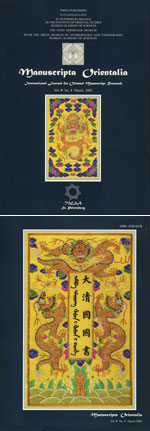|
|
| |

|

|
Tantlevskij I. Melchizedek and the Teacher of Righteousness: Some Peculiarities of Messianic and Eschatological Texts from Qumran // Manuscripta Orientalia. Vol. 9. No. 1. March 2003. P. 26—53.
First, I would like to dwell briefly on the figure of Melchizedek as he is represented in the Hebrew Bible, the 2 (Slavonic) Enoch, Philo of Alexandria’s treatises, the New Testament, and early Christian and Rabbinic literature. In the Hebrew Bible, Melchizedek is mentioned twice. 1) Genesis 14:18—20 relates that Abram (Abraham), following the defeat of the coalition of kings headed by Chedorlaomer, king of Elam, is greeted by Melchizedek, king of Salem (sc. most probably Jerusalem) and priest of God the Most High, that is, a figure who combines the lay and sacerdotal functions. Since Chedorlaomer is described in Gen. 14 as the suzerain over the Promised Land, Abram’s military triumph could mean that the patriarch had gained the rights to the country. Melchizedek brings Abram bread and wine and blesses him and God the Most High; in turn, Abram gives Melchizedek “tithes of all”, thus acknowledging his superiority. 2) The enthronement oracle, attested in Psalm 110, mentions the king of Salem in the following context: The Lord said unto my Lord: ‘Sit (enthroned) at My Right Hand, until I make thine enemies thy footstool’. The Lord shall send the rod of thy strength from Zion: rule thou in the midst of thine enemies. Honour is with thee [6] in the day of thy power, in the glory of holiness; from the womb before the dawn like the dew have I begotten thee. The Lord hath sworn, and will not repent: ‘Thou art a Priest for ever after the order of Melchizedek’ (verses 1—4)…
К содержанию выпуска... PDF-файлы PDF-файлы
Полный текст статьи
Ключевые слова
Мельхиседек
тексты кумранские
|
|
|
|
Случайная новость: Объявления |
|
25–26 ноября 2024 г. в ИВР РАН пройдут ХVIII Всероссийские востоковедные чтения памяти О.О. Розенберга. |
|
Подробнее...
|
|
|
|
|

